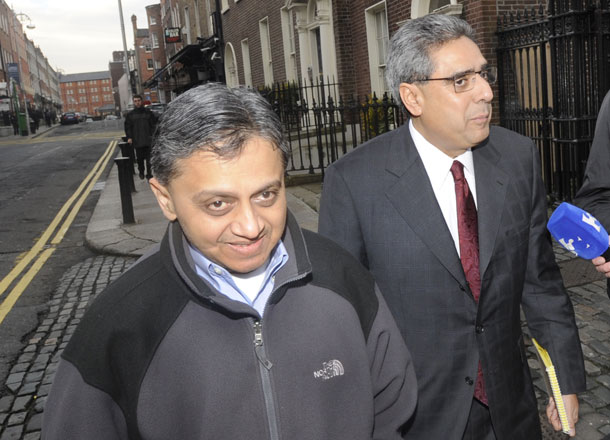5 August 2013 Edition
IMF insider blows the cover on failure of austerity

• International Monetary Fund former Chief of Mission Ashoka Mody urges Irish Government to put an end to austerity by holding out against further fiscal adjustments
The IMF insider said there’s ‘not one historical instance’ where austerity policies have led to an exit from heavy debt burden
THE IMF’s former Chief of Mission to Ireland, Ashoka Mody, certainly put the cat among the pigeons when he stridently criticised the EU-imposed policy of austerity, suggested that there should be no more ‘fiscal adjustment’ for three years, and argued that the alternative to austerity and poverty was growth and development.
There is, the ex-insider at the IMF said, “not one historical instance” where austerity policies have led to an exit from heavy debt burden.
While there is much evidence that his views are commonplace within the IMF, they caused consternation in Germany and the EU, and the IMF was constrained to disown its former colleague, claiming that the reduction in borrowing costs and the steps Ireland has taken to fund itself on the markets highlights the credibility of the programme.
The EU complaint, of course, is that while the IMF is critical of austerity it is not willing to finance the alternative.
But biggest laugh of the month came when Labour leader Eamon Gilmore responded to the first reports of Mody’s comments by claiming that Labour too is against austerity and HAD ALWAYS (yes, that’s what he said) been in favour of growth as the way out of the crisis. And he went on to claim that Labour was pursuing a policy to boost the economy and put growth back.
Imagine Gilmore’s confusion when the IMF rowed back on Mody and Labour was forced to accept that, notwithstanding earlier comments, austerity was indeed unavoidable as a policy.
And Finance Minister Michael Noonan pointedly rubbed it in when he declared that the Irish Government would not be ending its austerity policy, despite savings made after reform of debt deals.
The problem is that glaring through all the spin is the fact that the economy is not growing, that unemployment is appallingly high and that emigration is at tragic levels. There is no basis for Labour’s claims that it will be all alright in a year or two and that there’ll be jam tomorrow.
The fact is that the austerity programme, while crippling the majority of Irish people, is helping Europe’s rich (especially the banking sector based in Germany) to smooth over the cracks at the expense of the Irish, the Greeks, the Portuguese, Spanish and so on.
Economist David McWilliams also last month underscored Mody’s central point that austerity had never anywhere been a solution for a debt crisis. He argued that, without ‘monetary easing’, austerity can only be harmful by suppressing demand on the back of suppressed demand.

• Economist David McWilliams and Tánaiste Eamon Gilmore
And what is ‘monetary easing’ then? Basically, it means printing more money to be spent on goods and services for which otherwise there would be no demand.
But there are two problems with this.
Firstly, in an open economy like that of Ireland, extra money can too easily be frittered away on imported luxuries, this benefiting someone else’s economy. To get the benefit then the state must take a lead in actively creating employment, especially in capital projects like schools and so on.
Ironically, that WAS Labour’s policy during the election campaign but abandoned once the lure of office became apparent.
The second problem, however, is that we don’t have a currency which we can quantitatively ease, to beg a phrase. It’s the EU (and Germany) that control our currency, the euro, and so long as we remain tied to it we remain tied to the catastrophe that we are embroiled in.
What we need to do then is put an end to austerity by holding out against further fiscal adjustments (as Mody has urged) and re-establish our own currency whose exchange rate we can set at a level reflective of our weakened economic situation stimulating domestic growth and exports.
We could also reduce the burden of foreign debt by converting existing euro debts to ‘Punt Nua’ debts on a one-for-one basis and let devaluation (including outsider attacks on the currency) lower the debt internationally.
Strangely, this is broadly similar to the policy adopted by the Icelandic people when they rejected in a referendum the idea of paying off the foreign bankers whom they preferred to let swim until their own economy recovered.
And recover it did. Iceland, for some time, has been back in growth, can access international finance at affordable rates, has lowered unemployment and is a good place for business and work.
The only thing stopping us enjoying the same success is the subservience of the dominant political parties to the EU and the imposed policies of austerity.
Alas, for all Gilmore’s fine words, Labour is as committed as the rest to turning the austerity screw even tighter on working people in the next Budget.




